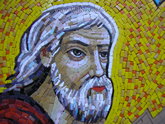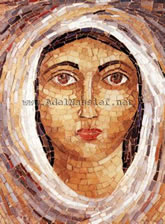- Arabic Corner
- Audio
- Bible Study
- Coptic Reader
- Children's Corner
- Deacons
- Evangelism & Apologetics
- Evangelism Pamphlets
- Interesting Facts
- Literature
- Pigori Productions
- Priests Corner
- Questions & Answers
- Reading Recommended
- Saintly Studies
- Servants Guide
- Sunday School Curriculum
- Sunday School Curriculum-Special Needs
- Youth Corner
Part II: Generational and Cultural Diversity
![]() Print
|
Print
|
![]() Send to a friend
|
Send to a friend
|
![]() Bookmark
|
Tweet
|
Bookmark
|
Tweet
|
![]() Back
Back

"Children obey your parents in the Lord, for this is right. 'Honor your father and mother,' which is the first commandment with promise: 'that it may be well with you and you may live long on the earth.' Any of you, fathers do not provoke your children to wrath, but bring them up in the training and admonition of the Lord" (Ephesians 6:1-4).
Introduction
Genealogy listings are endless in the Holy Bible. Who begat whom, who were common ancestors, the Davidic lineage of the Lord Jesus Christ, the genealogy of the Lord Jesus Christ are all recorded in the Holy Bible. Genealogy was important to the Holy Scripture writers; often so important genealogy was listed at the beginning of a chapter rather than at the end. Why?
Recorded ancestry was important to a Biblical nation. Through a recorded ancestor we learn of an ancestor's promise, we learn not to imitate an ancestor's sin, hypocrisy toward ancestors, and messages given to ancestors that impacted their lives and future generations.
In looking at recorded generations, one must also take into consideration the cultural diversity of each generation. Were they diverse or did Biblical generations pass down their "manner of living life" from one generation to another? Culture influenced people's temperament, could bring down the wrath of God, was affected by intermarriage and could be categorized as wise or foolish. Language and customs of a culture were important considerations in early evangelization and ministry of a culture.
Culture could build in protective mechanisms when used with discernment. It could warn against false teachings, assist those who believed in the One True God to avoid false gods, and help to avoid rejecting sound doctrine. Culture could help those within its confines to walk in the Truth and not wander from it, and be careful of strange teachings.
- From BEFORE the Creation Generations Were Established:
"We believe...in One Lord Jesus Christ, the Son of God, begotten of the Father, only begotten, that is of the substance of the Father, God of God; Light of Light, very God of very God; begotten not made; being of one substance with the Father" (Nicene Creed extended discussion)
Alexander of Alexandria teaches, "He is not begotten in a physical manner, not by excision or division but in a certain unexplainable and unspeakable manner. In the words of the prophet 'Who will declare His generation?' Because of His subsistence, no begotten nature can investigate Him—just as no one can investigate the Father. The nature of rational beings cannot comprehend the knowledge of His divine generation by the Father" (c. 324)
BRIDGING THE GENERATION GAP: Father and Son were of One accord as it should also be the manner of life led today. - From Ancient Biblical Times, Generations Served a Function:
 In the Holy Old Testament book of Joel the prophet, the attack of the Babylonians and a plague of locusts were calamities he used to urge continual faithfulness and ongoing repentance. Generations learned of devastation, repentance, deliverance, judgment and prosperity. These things would be taught for generations and their spiritual truths are the same for today's generation.
In the Holy Old Testament book of Joel the prophet, the attack of the Babylonians and a plague of locusts were calamities he used to urge continual faithfulness and ongoing repentance. Generations learned of devastation, repentance, deliverance, judgment and prosperity. These things would be taught for generations and their spiritual truths are the same for today's generation.
BRIDGING THE GENERATIONAL GAP: Gladly learn from previous generation's misfortunes and deliverances so that future generations do not share in the same pitfalls."The word of the Lord came to Joel the son of Pethuel. Hear this, you elders, and give ear, all of you inhabiting the land! Has anything like this happened in your days or even in the days of your fathers? Tell your children about it, let your children tell their children, and their children another generation" (Joel 1:1-3).
- Godly Generations Today Are Productive:
All generations stem from God. Before all worlds was God. Hermas (c. 150) states, "The Son of God is older than all His creatures, so that He was a Fellow-Counselor with the Father in His work of creation."
The Prophet Micah teaches,
BRIDGING THE GENERATIONAL GAP: Do your children have family responsibilities that encourage belonging? Do they work in the home for the goodness of the home family dynamics? Do they have such responsibilities that should they forget to do them, bear the consequences? Or do they complain of boredom because they do not?"But you, Bethlehem Ephrathah, though you are little among the thousands of Judah, yet out of you shall come forth to Me the One to be Ruler in Israel, whose goings forth are from of old, from everlasting" (Micah 5:2).
- Where Did the Generation Gap Originate?
We are all put on this earth as "children of promise". God is our Heavenly Father. So where is the gap in today's generation? Is there actually a self-evident gap?
Irenaeus (c. 180) wrote, "The promise of God that He gave to Abraham remains steadfast...For his seed is the church, which received the adoption of God through the Lord, as John the Baptist said, 'For God is able from the stones to raise up children to Abraham.' Thus also the apostle says in the Epistle to the Galatians, 'But you, brethren, as Isaac was, are the children of promise.'"
Perhaps today's "generational gap" is self created as the Holy Bible does not speak to a gap in generations unless they deviated from Biblical teachings and worship. Are we doing the same because...
BRIDGING THE GENERATIONAL GAP: Has the generational gap been an illusion of media, self-promoted by TV, use of electronic information dissemination or perhaps drugs and alcohol availability which makes one think they are worldly? Is the manner of life more important than the Heavenly life to be lived for and towards?"And if you are Christ's, then you are Abraham's seed, and heirs according to the promise" (Galatians 3:29).
What is actually the generational gap? A "no time" for family gap? Will history record this of our present generation? - Negative Adaptation of a Culture:
Israel intermarried with them (the enemy nations that remained in Canaan) and ultimately served their gods. They forgot the Lord. Without constant remembrances of the Lord within Israel's thoughts, words and deeds, man allowed himself to become most vulnerable to the deceptions and accusations of the enemy. Following the death of Joshua, Israel would follow false gods AND SUFFER AND THE GENERATIONS FOLLOWING THIS WOULD SUFFER.
A negative adoption of a culture would be to join a cult, a sect, a denominational church. A cult could be those who join together to gamble, to join in membership of those who accepted drinking and drugging, or join a sect of people who promoted prophets other than those listed in the Holy Bible."When all that generation had been gathered to their fathers, another generation arose after them who did not know the LORD nor the work which He had done for Israel" (Judges 2:10).
You know that you are outside the Coptic Church teachings when you begin to feel an internal sense of importance to the Coptic Church (i.e. without my money the church is nothing) and an internal perception of distinctiveness (i.e. the church could not function without my family). - Positive Adaptation of a Culture:
To many, cultural assimilation is the ability to speak excellent American English. Marital assimilation is further evidence of positive adaptation to a culture. Primary structural warm group interactions are essential at church, work place, and social groups which further demonstrate positive adaptations. Positive adaptation at all times primarily incorporate Coptic Church teachings and beliefs.
Were prophets appointed to prophecy because they were well learned, had a silky tongue, and could easily convince people to follow God? Or were they called by God? They were indeed called by God to preach and teach in the language of the majority of the land for understanding and conformity to the teachings.
When examining the generational/cultural gap one should consider the amount of time spent in family cohesiveness. Is your home over run by company, are the rooms filled with distractions, is the business of life the priority of the family day? Is the work ethic so strong that more is never enough?
Fathers do you spend minutes or hours in one–on-one conversation with your son? Do you instill in him the most important basics of Holy Biblical teachings leaving him with a desire to learn even more? Do you teach the faithfulness of our Father Abraham?
Mothers do you spend minutes or hours in one-on-one conversation with your daughter? Do you instill in her the love that consumed St. Mary? Do you instill in her the desire to love God as did St. Mary? Children, do you love your parents, honor and cherish them as the Lord commanded? Do you entreat them to have a family hour of prayer and reading the Holy Bible at night to nourish your souls?
Children, do you love your parents, honor and cherish them as the Lord commanded? Do you entreat them to have a family hour of prayer and reading the Holy Bible at night to nourish your souls?
Doing the will of the Father in Heaven earmarks the golden standard of positive adaptation of a culture.
"Now, we believe that Christ did ever act in the name of God the Father...We believe that He was the Son of the Creator and that He was His Word. God made Him His Son by emitting from Him from Himself. He thereafter set the Son over every dispensation of His Will" (Tertullian c. 207).
The Lord Jesus Christ was among and within many cultures during His ministry. He positively adapted to His surroundings. How do we know? Multitudes believed and followed Him. - Influence of Culture Upon Religion:
The prophet Jeremiah prophesied the persecution and destruction of Jerusalem and the great Temple of Solomon. Jeremiah of the tribe of Benjamin begins his Holy Old Testament Book with generational introduction:
Fathers, sons, lineage again is emphasized here as important. Tribes and ancestry was important. If it were not it would have been said 'Jeremiah prophesied during the reigns of Josiah, Jehoiakim and Zedekiah.'"The words of Jeremiah the son of Hilkiah, of the priests who were in Anathoth in the land of Benjamin, to whom the word of the LORD came in the days of Josiah the son of Amon, king of Judah, in the thirteenth year of his reign. It came also in the days of Jehoiakim the son of Josiah, king of Judah, until the end of the eleventh year of Zedekiah the son of Josiah, king of Judah, until the carrying away of Jerusalem captive in the fifth month" (Jeremiah 1:1-3).
Jeremiah warns the people of Israel to hold fast to their belief in God and to avoid the Gentiles. God put these words into Jeremiah's mouth:
Jeremiah's message is an important one...Israel was not told to avoid the Gentiles because they do not do things in the same manner as the Israelites do. They were not instructed to avoid the Gentiles because their language was not the same. The Israelites are not told to avoid the Gentiles because their country of origin or ancestry was different. Rather the Israelites were SPECIFICALLY told to avoid the Gentiles because they do not believe in God."Hear the word which the LORD speaks to you, O house of Israel. Thus says the LORD: 'Do not learn the way of the Gentiles; do not be dismayed at the signs of heaven, for the Gentiles are dismayed at them. For the customs of the peoples are futile; for one cuts a tree from the forest, the work of the hands of the workman, with the ax. They decorate it with silver and gold; they fasten it with nails and hammers so that it will not topple.'" (Jeremiah 10:1-4).
We are specifically taught that the Prophet Joel from the tribe of Reuben proclaims we are to avoid ALL THOSE who do not believe in God.
BRIGDING THE CULTURAL GAP: A father must teach his son the Word of God. Not tomorrow but today. Not in the available time, but the designated time. Out of discerned, studied Biblical teaching, respect grows and culture is understood in positive affirmation. If this is not done the son may be following the crowd of his peers in total confusion of who he is and should become.
Summary Diverse generational and cultural groups blend to a common whole. A Coptic Church with diverse members is a spiritually sound church in its preaching and teachings. It comes together based on Apostolic teachings and embraces its generational and cultural differences in its diversity.
Diverse generational and cultural groups blend to a common whole. A Coptic Church with diverse members is a spiritually sound church in its preaching and teachings. It comes together based on Apostolic teachings and embraces its generational and cultural differences in its diversity.
While the generation gap is the talk of the day, perhaps for our audiences' purposes cultural gaps have plied us as Copts more than preceding and present generations.
Culture is "the sum total of socially inherited characteristics of a human group that comprises everything which one generation can tell, convey or hand down to the next, in other words, the non-physically inherited traits we posses" (Specter, Cultural Diversity and Health).
Culture is the baggage we carry around during our lifetime. It is our beliefs, practices, habits, likes, dislikes, norms, customs, rituals, and learned behaviors we have learned from our families during our early years of socialization. We in turn transmit this cultural baggage to our children.
The society in which we live--its political climate, economic forces and social morals tend to alter the way in which some aspects of a particular culture are transmitted and maintained. Most of the essential components of a culture will remain and be passed on from one generation to another. This is called cultural diversity. Much of what we believe, think, and do both consciously and unconsciously is determined by our cultural background.
Cultural encompasses three important points of heritage: extended family, participation in folk ways, and language. Shared geographic origin, migratory status, race, language, religious faith, shared values and symbols, music, food preferences are all aspects of culture.
"And from all their territories the priests and the Levites who were in all Israel took their stand with him. For the Levites left their common-lands and their possessions and came to Judah and Jerusalem, for Jeroboam and his sons had rejected them from serving as priests to the LORD. Then he appointed for himself priests for the high places, for the demons, and the calf idols which he had made. And after the Levites left, those from all the tribes of Israel, such as set their heart to seek the LORD God of Israel, came to Jerusalem to sacrifice to the LORD God of their fathers. So they strengthened the kingdom of Judah, and made Rehoboam the son of Solomon strong for three years, because they walked in the way of David and Solomon for three years" (II Chronicles 11:13-17).
Those with right worship were rejected by Jeroboam because they served and worshipped God according to the traditions established by God through their fathers.
"Therefore brethren stand fast and hold the traditions which you were taught, whether by word or our epistle" (II Thessalonians 2:15).
We all are from the same generation of men...
"Jesus said to them, 'Most assuredly, I say to you, before Abraham was, I AM.'" (John 8:58).
We are all from the same origins of culture...
"The timeless and unoriginated First Principle and Beginning of existences—the Son—from whom we are to learn the remoter Cause of the universe, the Father, the most ancient and the most beneficent of all" (Clement of Alexandria, c. 195).
There should be no gaps...
YES, WE BELIEVE IN THE HOLY SPIRIT, THE LORD, THE LIFE GIVER, WHO PROCEEDS FROM THE FATHER, WHO WITH THE FATHER AND THE SON IS WORSHIPPED AND GLORIFIED, WHO SPOKE IN THE PROPHETS.
Bishop Youssef
Bishop, Coptic Orthodox Diocese of the Southern United States
![]() Print
|
Print
|
![]() Send to a friend
|
Send to a friend
|
![]() Bookmark
|
Tweet
|
Bookmark
|
Tweet
|
![]() Back
Back